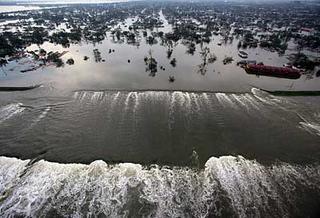
Will Bunch in an article entitled
Did New Orleans Catastrophe Have to Happen? points out that choices have consequences. Many thoughtful citizens have spoken out about the fact that funds have been diverted from worthy domestic programs, including homeland security programs, to fund the foolish and failing neocon adventure in Iraq. Somehow the argument just seemed too abstract...until now. Now, in New Orleans, we see the human suffering and the economic distaster that is a direct result of diverting America's resources to Iraq.
In early 2004, as the cost of the conflict in Iraq soared, President Bush proposed spending less than 20 percent of what the Corps said was needed for Lake Pontchartrain, according to a Feb. 16, 2004, article, in New Orleans CityBusiness.
On June 8, 2004, Walter Maestri, emergency management chief for Jefferson Parish, Louisiana; told the Times-Picayune: 'It appears that the money has been moved in the president's budget to handle homeland security and the war in Iraq, and I suppose that's the price we pay. Nobody locally is happy that the levees can't be finished, and we are doing everything we can to make the case that this is a security issue for us.'
 From Daily Kos
From Daily Kos Mike Ramirez, LA Times
Mike Ramirez, LA Times



